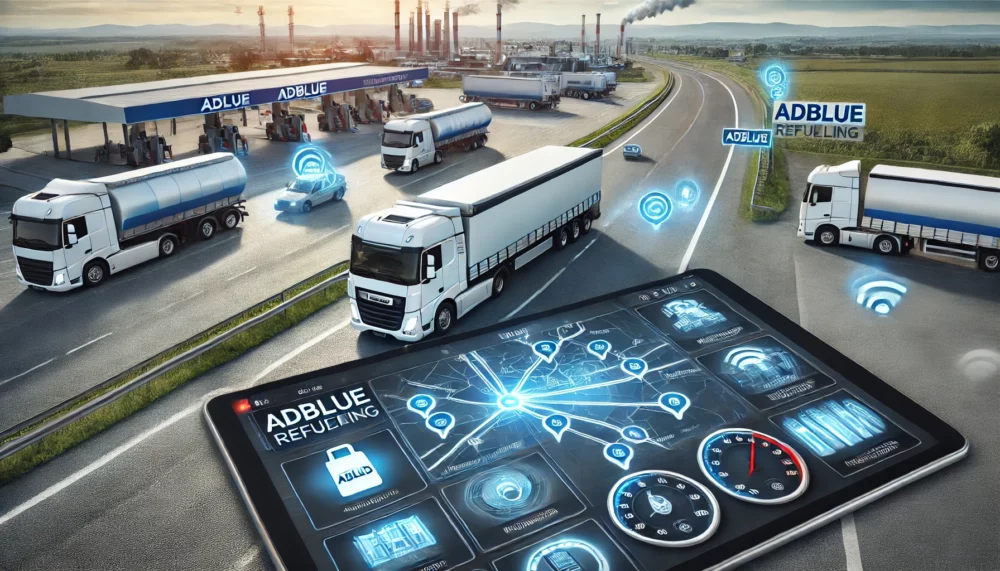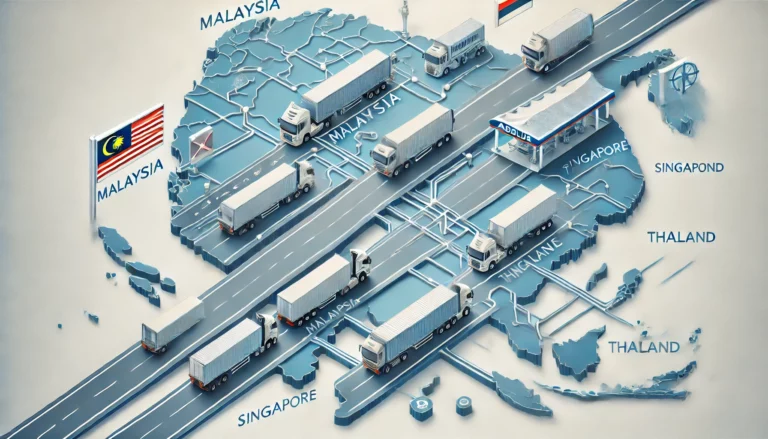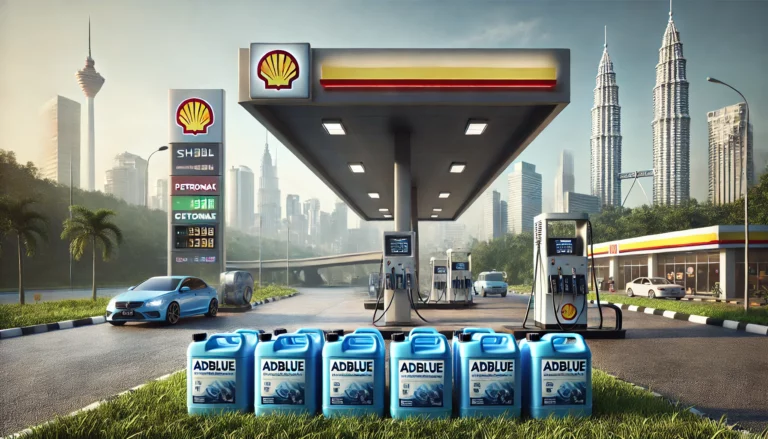In the fast-paced world of logistics, truck owners face mounting pressure to maintain operational efficiency while staying compliant with environmental regulations.
For trucking companies in Malaysia, strategic route management is not just a matter of convenience—it’s essential for keeping costs down, ensuring timely deliveries, and meeting emissions standards.
One of the key players in this equation is AdBlue®, the liquid solution that helps reduce emissions from diesel engines.
By optimizing your routes and strategically managing AdBlue® refueling, you can significantly improve your fleet’s performance, cut down on fuel consumption, and stay compliant with Malaysia’s emissions regulations.
This blog will explore actionable tips on how you can streamline your operations, saving both time and money, while contributing to a cleaner environment.
AdBlue® Refueling Point Strategic Planning
Route Mapping
When it comes to managing AdBlue® refueling stops, route planning is crucial. In Malaysia, truckers often deal with long-distance routes across highways and rural roads.
It’s vital to ensure that AdBlue® availability is factored into route planning to avoid any unnecessary detours or delays.
With local GPS and mapping software, logistics managers can identify refueling stations offering AdBlue® along key highways like the PLUS Expressway or the East Coast Expressway.
By keeping this information updated, your fleet can stick to planned routes without wasting fuel or time searching for refueling stations.
Strategic planning of refueling points, particularly in remote areas, can help prevent trucks from running low on AdBlue® and risking compliance issues.
Driver Schedules
Aligning your drivers’ schedules with planned refueling stops is equally important. Malaysian road conditions, such as frequent construction zones or traffic congestion in urban areas like Kuala Lumpur, can make timing critical.
By coordinating refueling stops within driver schedules, you can prevent unplanned deviations and reduce idle time, ultimately saving fuel.
This proactive approach ensures that trucks remain compliant with emissions regulations without sacrificing delivery timelines.

Advanced Route Optimization Software Usage
Traffic Analysis
Malaysian roads can be unpredictable, with peak hour congestion in cities and potential delays on major highways.
Advanced route optimization software can help logistics managers navigate these challenges by providing real-time traffic data.
By rerouting trucks away from traffic jams or construction zones, your fleet can avoid unnecessary fuel consumption and reduce emissions, all while staying on schedule.
Fuel Consumption Tracking
Monitoring fuel consumption is another critical factor in optimizing routes.
By using software to track fuel usage patterns, logistics managers can identify areas for improvement, such as reducing idle time, optimizing load sizes, or adjusting delivery schedules.
In Malaysia, where fluctuating fuel prices can significantly impact operational costs, tracking consumption closely is key to maintaining profitability.
Weather Forecasting
Malaysia’s tropical climate brings frequent rain and occasional flooding, both of which can disrupt logistics operations.
Incorporating weather forecasts into your route planning allows you to reroute trucks during heavy downpours, avoiding delays and dangerous road conditions.
This proactive planning helps minimize disruptions and keeps fuel consumption in check by avoiding stop-and-go traffic caused by poor weather.
Continuous Monitoring of Emission Compliance
Emission Tracking Systems
Adhering to Malaysia’s emissions regulations is a top priority for logistics companies.
Real-time emission tracking systems allow fleet managers to monitor emissions and ensure compliance with government standards.
With the implementation of SCR systems and the use of AdBlue®, trucks can maintain lower emissions levels.
If an issue arises, such as a malfunctioning SCR system, immediate alerts enable drivers to take corrective action before non-compliance penalties come into play.
Regular Maintenance Checks
Keeping your SCR systems and AdBlue® injection equipment in top condition is essential for maintaining compliance.
Regular maintenance checks will help identify any equipment malfunctions, ensuring that trucks continue to meet Malaysia’s emissions standards.
Preventive maintenance not only keeps operations running smoothly but also extends the life of your equipment, saving you from costly repairs down the road.
Compliance Audits
Staying up to date with Malaysia’s evolving environmental regulations is essential for avoiding penalties.
Regular compliance audits provide valuable insights into how well your company is managing emissions and where improvements can be made.
These audits are especially important for logistics companies operating across different states, where regulations may vary slightly.
Staying ahead of compliance standards helps you avoid fines and demonstrates your commitment to environmental responsibility.
Driver Training and Motivational Workshops
Education on AdBlue® Usage
To meet emissions standards, it’s critical that drivers understand how to properly use AdBlue®.
Training programs should focus on the correct refilling process and the importance of AdBlue® in reducing emissions.
Well-trained drivers are more likely to follow best practices, keeping your fleet compliant and minimizing the risk of fines.
Environmental Impact Awareness
Creating a culture of environmental responsibility within your company is key to long-term success.
Teaching drivers how their driving behaviors affect fuel consumption and emissions can go a long way.
Simple changes like maintaining steady speeds, avoiding rapid acceleration, and minimizing idle time can significantly reduce fuel consumption and emissions.
Encouraging fuel-efficient driving habits benefits both the environment and your bottom line.
Feedback Mechanisms
Establishing clear communication channels between drivers and fleet managers is essential for keeping operations running smoothly.
If drivers encounter issues with AdBlue® availability or equipment, they should be able to report it quickly, ensuring that problems are resolved promptly.
Feedback from drivers can also help refine route planning and improve overall efficiency.
Working with Suppliers and Partners
Supply Chain Coordination
Collaborating with reliable AdBlue® suppliers is essential for maintaining a steady supply and preventing disruptions.
By coordinating delivery schedules and exploring bulk purchasing options, you can ensure that your fleet always has access to AdBlue® when needed.
In Malaysia, where long distances between urban centers are common, maintaining a consistent supply chain is key to avoiding costly delays.
Industry Partnerships
Staying informed about industry best practices for emissions reduction and route management is critical for long-term success.
Joining local industry groups or participating in forums can provide valuable insights and help your company stay competitive.
Collaborating with other logistics companies allows you to share knowledge and stay updated on the latest innovations in route optimization and sustainability.
Optimize Your Routes, Maximize Your Savings
By implementing these enhanced route management techniques, logistics companies in Malaysia can improve efficiency, reduce fuel consumption, and ensure compliance with emissions regulations.
Strategic planning of AdBlue® refueling points, driver education, and the use of advanced route optimization software all contribute to a more sustainable and cost-effective operation.
As Southeast Asia continues to play a pivotal role in global trade, it’s more important than ever for Malaysian logistics companies to adopt sustainable practices that support both their business and the environment.
Try Our Services at BlueDiesel
If you’re ready to take your logistics operations to the next level, let BlueDiesel help you optimize your routes and ensure consistent access to AdBlue®.
Visit BlueDiesel.com to learn more about our services and how we can help your fleet run more efficiently and sustainably.





